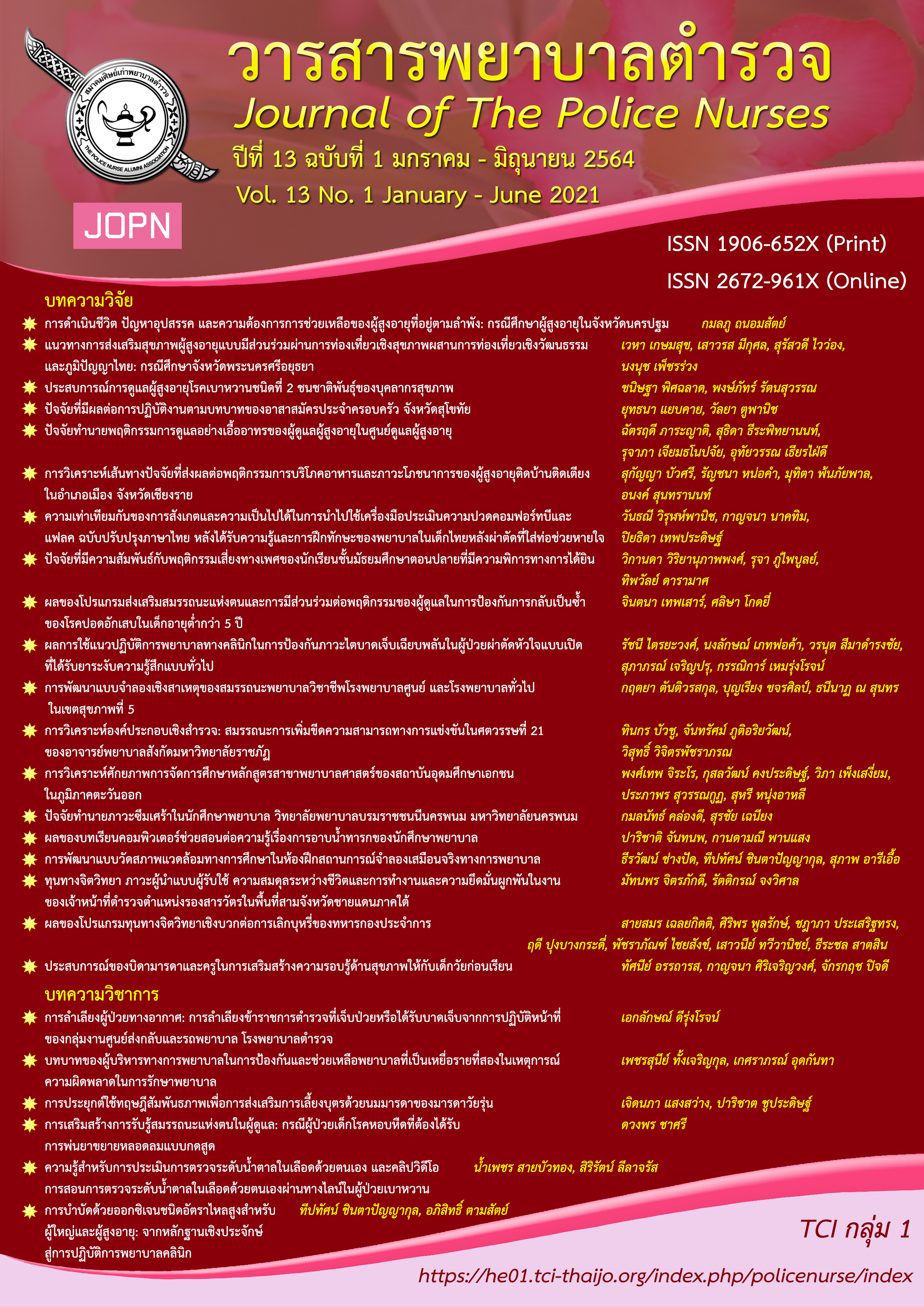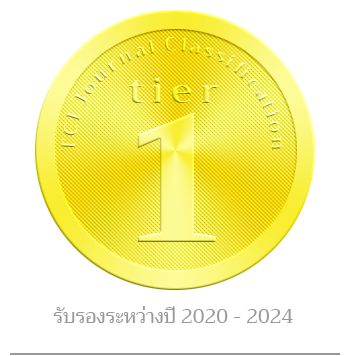PARTICIPATORY HEALTH PROMOTION GUIDELINES FOR OLDER ADULT THROUGH HEALTH TOURISM INTEGRATED WITH CULTURAL TOURISM AND THAI WISDOM: CASE STUDY OF AYUTTHAYA PROVINCE
Keywords:
guidelines for promoting older adults health, health tourism, cultural and Thai wisdom tourismAbstract
This qualitative research aims to study and find out the guideline for promote health of the older adults through participatory health tourism combined with cultural tourism and Thai wisdom. The informants were older adults and stakeholders who involved with tourism and Thai traditional medicine (Executives and staff from agencies related to health and tourism in Phra Nakhon Si Ayutthaya province and Thai traditional medicines working in community hospitals), a group of 12 people, totaling 36 people. Data were collected by focus group discussions using semi-structured questionnaire. Data were analyzed by content analysis and checking the credibility with triangulation methods.
The result revealed that the guidelines for promoting health of the older adults through participatory health tourism combined with cultural tourism and Thai wisdom are as follows: 4H (Four-H) principles as follows: 1) Create a health tourism activities in accordance with the context, area and target groups, 2) Focus on the holistic to promote physical health, mental health and income for the older adults, 3) Focus on behaviors modification linking to Thai cultural and wisdom and, 4) Strengthen the new generation of health leaders, continue to sustain Thai cultural and wisdom. This guideline is not only focuses on meeting the real needs approach of older adults and their network partners, but also involve the older adults to take part in tourism management both leadership and member roles in the health tourism combined with cultural tourism and Thai wisdom. As a result, the elderly can take care of themselves and perform various activities more efficiently. In addition, it also creates strength in both physical and mental health and helps the elderly to be involved with the community and society, be secure, have sufficient income to live, able to maintain the function of various organs, and live independently of their own potential.
Downloads
References
Castora-Binkley, M., Noelker, L., Prohaska, T., & Satariano, W. (2010). Impact of arts participation on health outcomes for older adults. Journal of Aging, Humanities, and the Arts, 4(4), 352-367.
Foundation of Thai Gerontology Research and Development Institute. (2020). Situation of the Thai elderly 2019. Bangkok: Printory.
Department of Older Persons. (2020). The Thai elderly statistic. Retrieved from http://www.dop.go.th/th/know/side/1/2/52
Kasemsuk, W., Jitcharat, S., Makapol, J., & Jitaram, P. (2019). The guideline to promote Lifelong Learning for elderly school. Journal of The Police Nurses, 11(2), 261-271.
Laohaphan, T., & Jaturathamrong, U. (2009). Thai traditional medicine in the Faculty of Medicine Siriraj hospital. Bangkok: Suvapanich.
Meekusol, S., Kasemsuk W., Tantiwongsekunakorn, A., & Siripukdeekan C. (2020). State and needs for health tourism integrated with cultural tourism and Thai wisdom case study of Ayutthaya province: Stakeholders perspective. Journal of The Royal Thai Army Nurses, 21(3),453-462.
Ministry of Public Health. (2016). The 20-year national strategy (public health). Nonthaburi: Ministry of Public Health.
Ministry of Tourism and Sports (2017). Ministry of tourism and sports strategic 5 years plan (2017-2021). Bangkok: Ministry of Tourism and Sports.
National Statistical Office. (2016). The 2016 survey of the older persons in Thailand. Bangkok: Text and Journal Publication.
Pongsaengpan, P., & Rodjarkpai, Y. (2014). Community participation on elderly health promotion in Eastern Thailand. The Public Health Journal of Burapha University, 9(2), 13-20.
Ruggeri, K., Záliš, L., Meurice, C. R., Hilton, I., Ly, T. L., Zupan, Z., & Hinrichs, S. (2015). Evidence on global medical travel. Bulletin of the World Health Organization, 93, 785-789.
Sukrung, S., Pranpravit, A., & Pumprawi, A. (2018). Community participation on the health promotion behavior of the elderly with AIC technique in Rommanee subdistrict, Kapong district, Phangga. Community Health Development Quarterly Khon Kaen University, 6(2),159-176.
World Health Organization. (2002). Active ageing a policy framework. Retrieved from http://apps.who.int/iris/bitstream/10665/67215/1/WHO_NMH_NPH_02.8.pdf
World Tourism Organization. (2020). Yearbook of tourism statistics, data 2014 – 2018, 2020 edition. Madrid: UNWTO.
Yoksakul. K. (2008). Participation of the elderly in creating health activities (Thesis of Master of Education, Health Promotion). Graduate school Chiang Mai University, Chiang Mai.
Downloads
Published
How to Cite
Issue
Section
License
ผลงานที่ได้ตีพิมพ์แล้วจะเป็นลิขสิทธิ์ของวารสารพยาบาลตำรวจ



